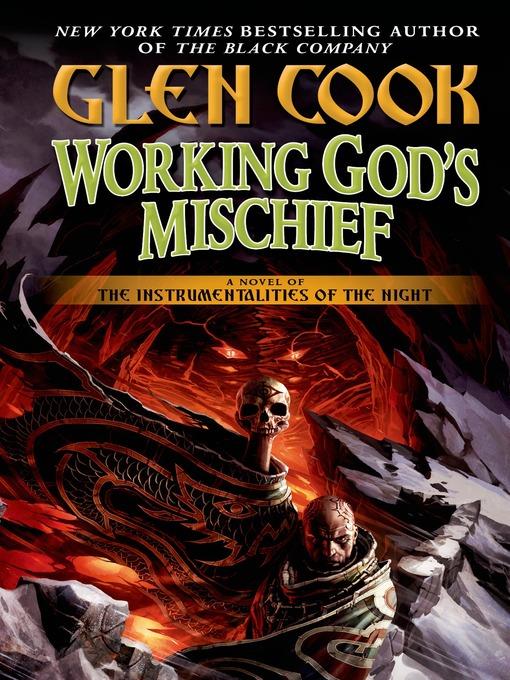
Working God's Mischief
Instrumentalities of the Night Series, Book 4
کتاب های مرتبط
- اطلاعات
- نقد و بررسی
- دیدگاه کاربران
نقد و بررسی

January 6, 2014
Cook’s fourth Instrumentalities of the Night epic installment (after Surrender to the Will of the Night) demonstrates his talent for contrasting mundane characters with monumental backdrops. Monarchs have fallen, clerical leaders have been deposed, and gods themselves have died. Now Godslayer Piper Hecht, a man of masks and nested identities, forces some of the remaining divinities to surrender to his will, celestial powers bending to the service of secular interests. But Hecht is not the only one determined to reshape the world in his image, and, as empires become unstable, occult powers conspire in the shadows. The fate of nations and pantheons proves subject to blind chance and the whims of mortals. Instrumentalities of the Night feels like a reexamination of Cook’s Dread Empire series: both use secondary worlds greatly influenced by Europe and Asia, both concern themselves with the catalytic role of determined mortals in global affairs, and both present grand histories with a certain air of absurdity. Cook’s decades of experience and expanded modern page counts allow him to weave a complex plot, but the result is comfortingly familiar to his longtime fans.

January 15, 2014
Fourth in the series (Surrender to the Will of the Night, 2010, etc.) featuring an alternate-world 13th century, the era of the crusades--along with gods, demons, monsters and wizards. That being said, Cook disdains any explanations or even hints that might help ease newcomers into the flow. The Aelen Kofer, or dwarf wizards, trapped the Old Gods in a space-time bubble. Fresh from his success in killing the worst of these, Piper Hecht, along with his allies (including his sister Heris, ancestor Cloven Februaren, and Ferris Renfrow, all wizards), intends to release them in controlled fashion--and either kill them or force them to bargain for their lives. The gods that survive this process, perhaps daunted to discover how little magic power survives outside their ancient prison, seem biddable, cooperative and trustworthy--but they rapidly grow bored and start getting into mischief. Elsewhere, an enigmatic four-armed woman with supernatural powers visits Brother Candle, Countess Socia and Bernardin Amberchelle and, even more mysteriously, bestows astonishing gifts on them. Despite the presence of real, tangible gods, belief in the One God is strong, and the armies of the Grail Empire are preparing for another crusade against Hecht's former coreligionists, the Praman. Winters grow longer, the ice builds and expands. And, seemingly out of nowhere, Hecht conceives an urgent need to recover Grinling, a lost magic ring wrought by the Aelen Kofer. All this, in Cook's capable hands, comes across as less derivative than it might appear in summary; his characters have substance, their conversations sparkle. What he doesn't convey are any senses of urgency, what it all means, why it matters or how it fits into the context of the series. Presumably, you have to start at the beginning, and readers looking for a lengthy, well-narrated, but rather shapeless immersion should do just that.
COPYRIGHT(2014) Kirkus Reviews, ALL RIGHTS RESERVED.

February 1, 2014
The latest novel in the Instrumentalities of the Night poses a whole new set of crises. The empress is dead. The patriarch is a hunted fugitive, in no position to sort out the consequences of the impending war of the gods. And that war will be the worse for the most potent of the Instrumentalities, the Windwalker, having been slain by a mortal. This makes the Instrumentalities uneasy, and uneasy gods are not pleasant to have around. The tone is even darker for the story being told mostly from the point of view of the grunts or at least their leaders, who must lay their lives on the line so often that, even if their side wins, they will not be around to enjoy it. But then, Glen Cook has been doing that in his fantasy since The Black Company (1984) and still does it very well.(Reprinted with permission of Booklist, copyright 2014, American Library Association.)

























دیدگاه کاربران